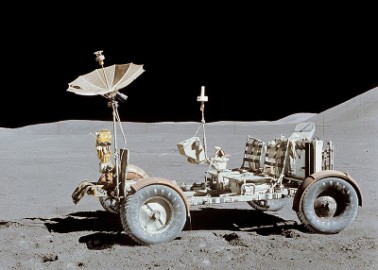Cecil Johnson – RIP

Lunar Rover
Let me say this about that.
I received sad news a few days ago.  Professor Cecil G. Johnson, World War II bomber pilot,  Georgia Tech engineering professor extraordinaire, and my mentor passed away last Sunday.  To characterize Prof. Johnson as as an educator would be like saying Mohammad Ali was merely a boxer.  Cecil Johnson was a giant among men when it came to creating engineers.  He is credited with transforming over 10,000 young men and women into engineers Рand I am proud to be one of them.
Prof. Johnson taught an engineering ¬†“Case Studies” course.¬† This senior level course was originally created to be taught¬†¬†in a fashion similiar¬†to¬†the Harvard Graduate School of Business case studies.¬† The student is presented with…¬†¬†¬† a real life situation and¬†how¬†it was addressed¬†by the person or company being studied.¬† The student then¬†reports to the professor his observations and what he may have learned.
Not with Cecil.
Oh, you got real life problems all right.¬† But what Cecil wanted to know is how you would handle them.¬† And, these were not ordinary engineering problems.¬† These were Cecil Johnson problems and were designed to prepare you to become the best damn engineer in the room.¬† The first day I entered his “Case Studies” class, he presented me with this problem:
Prof. Johnson:¬† “A high school sophomore physics student knows that electricity can be generated by passing a metal wire rapidly through a magnetic field.¬† The formula to make this calculation is elementary, so I will not¬†insult you with a simple calculation of electric current generation.¬† I will, however, put the problem into a real world situation.¬† You take it from there.”
Johnson then proceeds to describe an airplane ….. it’s make, model, wing span, flight characteristics, glide ratio, fuselage skin metalergy, flight ceiling, top speed, maximum take-off weight …. in short, everything you could ever know about this particular aircraft.
Shambo:¬† “Prof. Johnson, what does all this have to do with calculating the amount of electrical current generated by passing a wire through a magnetic field?”
He ignored the interruption and continued with his problem.  He then described the exact altitude of the aircraft, the speed in knots, the latitude and longitude (which turned out to be somewhere over Panama), flight direction, relative humidity and barometric pressure.  He proceeded to describe the voice communication system on this particular aircraft (a fairly standard FM type) and then noted that the radio antenna consisted of a wire attached at one end to the top of the vertical tail wing Рand Рto a four inch metal post immediately above the cockpit on the other end.  He finished by describing the metal composition of the wire antenna and the gauge.
At this point, I’m thinking¬†the problem has more to do with aircraft than electrical current generation – until he stated the problem:
Prof. Johnson:¬† “What is the amount of electrical current generated by the aircraft’s radio antenna as it passes through the Earth’s magnetic field?”
Shambo:¬† “What !?!?”
As it turned out, you cannot make a precise calculation (the only kind Prof. Johnson accepted) without most all the information he gave me in his statement of the problem and I worked my ass off for two weeks to solve it.  When I gave him my answer, he simply proceeded to give me an even tougher problem.   And, this was the way it continued  with Professor Cecil Johnson for the better part of a year.  He made me hard.  He made me unafraid of difficult problems.  He made me an engineer capable of making a difference in the real world.
Shortly after I graduated with my bachelors degree in engineering, I found myself working on¬†NASA’s Apollo moon landing¬†program.¬† I was called into a meeting one afternoon and a¬†senior engineer started the meeting with a problem statement.
Senior Engineer:¬† “Gentlemen, we are going to be working a new project to design and build a¬†collapsible dune-buggy that will carry two passengers …….. on the surface of the moon.”
I thought about Professor Cecil Johnson that day, and I’m thinking about him now.
And, that’s all I have to say about that.
Shambo

A known Relative 25th February 2013
Cecil Johnson was my grandfather. He was and still is the smartest man I ever knew. I heard he was a tough professor and sometimes he was a tough grandfather. I know now how much of a great and strong person he was. I strive to be like him everyday. People should be proud to have known him and I am very proud to be related to him. I wish in my young age I would have taken more advantage of his knowledge and listened to him more.